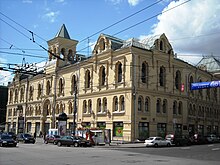Политехнический музей | |
 Polytechnic Museum, 2010 | |
| Established | 1872 |
|---|---|
| Location | Moscow, Russia |
| Coordinates | 55°45′20″N 37°36′35″E / 55.75556°N 37.60972°E |
| Type | Science Museum |
| Collection size | circa 160,000 items in 65 halls |
| Website | polymus |
The Polytechnic Museum (Russian: Политехнический музей) is one of the oldest science museums in the world and is located in Moscow. It showcases Russian and Soviet technology and science, as well as modern inventions. It was founded in 1872 after the first All-Russian Technical Exhibition on the bicentennial anniversary of the birth of Peter the Great at the initiative of the Society of Devotees of Natural Science, Anthropology, and Ethnography.[1] The first stage of the museum was designed by Ippolit Monighetti and completed in 1877.[1] The north wing was added in 1896 and the south wing in 1907.
The Polytechnic Museum is the largest technical museum in Russia, and houses a wide range of historical inventions and technological achievements, including humanoid automata of the 18th century, and the first Soviet computers. The collection contains over 160,000 items in 65 halls including, chemistry, mining, metallurgy, transport, energy, optics, automation, computer engineering, radio electronics, communications, and space exploration. Highlights include the first achromatic telescope; an early solar microscope by German anatomists Johann Nathanael Lieberkühn; an early seismograph by Boris Borisovich Galitzine; galvanoplastics by Moritz von Jacobi; and early electric lights by Pavel Yablochkov.[2]
- ^ a b Polytechnic Museum, History
- ^ Polytechnical museum, The Museum Collections
